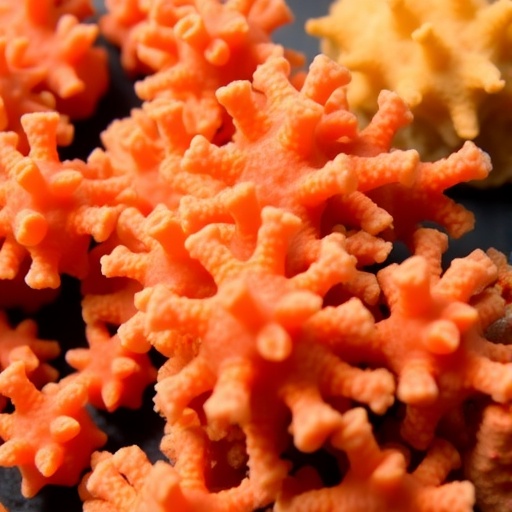In a groundbreaking study published in Coral Reefs, researchers delve into the intricate world of barnacles that inhabit coral structures across the Indo-West Pacific. This research contributes significantly to our understanding of the ecological roles and diversification of marine species, particularly focusing on the dichotomy between generalist and specialist barnacles. The complex interrelationships between these organisms and their coral hosts reflect broader implications for biodiversity in coral reef ecosystems, which are increasingly threatened by climate change and human activities.
Barnacles are intriguing organisms, often overshadowed by more charismatic marine fauna. However, their adaptive strategies in colonizing coral surfaces reveal much about ecological dynamics. The study underlines that while some barnacle species thrive on a multitude of coral species (generalists), others exhibit a strong preference for specific corals (specialists). This distinction has profound implications for understanding species resilience amid environmental stressors. The research team, comprising Lin, Halasan, Nozawa, and others, utilized a combination of genetic analysis and ecological surveying to elucidate the mechanisms that govern barnacle distribution across various coral habitats.
Central to the article is the exploration of how generalist barnacles can exploit a broad spectrum of coral environments, allowing them to establish themselves in fluctuating conditions. Such flexibility not only aids their survival but may also enable these barnacles to play a crucial role in the health and maintenance of coral reefs. By colonizing multiple coral families, generalist barnacles can influence the nutrient cycling and contribute to the overall biodiversity of reef ecosystems.
Conversely, specialist barnacles, which are tailored to specific coral types, face different challenges. Their narrow habitat preferences can render them vulnerable to changes in coral populations caused by climate change or coral bleaching events. The study posits that understanding the ecological niches occupied by these specialists is critical for conservation efforts. The fate of specialist barnacles is intricately linked to the health of their preferred coral species, which could face extinction pressures in a warming ocean.
The researchers employed an array of modern techniques, including molecular methods for species identification and extensive field surveys, to compile a comprehensive view of barnacle diversity. By comparing genetic data from various populations, they were able to delineate the lineages of generalist and specialist barnacles, mapping their evolutionary trajectories in relation to their coral hosts. The findings suggest that adaptive radiation has occurred in barnacle lineages in response to the available ecological niches on coral reefs.
Climate change, particularly the phenomenon of ocean warming, poses severe threats to coral reef ecosystems. As temperatures rise, the resilience of coral species diminishes, leading to widespread bleaching. The study emphasizes that the loss of coral not only endangers the corals themselves but also the myriad organisms that depend on them, including barnacles. As generalist barnacles may fare better in changing conditions, the differential impacts on barnacle populations highlight a critical area for further research.
One of the novel aspects of this study is its focus on the interplay between these barnacle types and their adaptability to a range of environmental pressures. The researchers argue that understanding this flexibility is vital in predicting how marine species may respond to ongoing ecological changes. This highlights a urgent need to protect coral reefs not just for their intrinsic value but also for their role in supporting distinct marine communities.
It is also crucial to recognize the anthropogenic factors contributing to reef degradation. Pollution, overfishing, and coastal development not only threaten the corals but disrupt the entire coral-associated community. The intricate balance between corals and their symbiotic inhabitants, like barnacles, can be easily upset, underscoring the need for integrated management strategies that consider the complexities of marine ecosystems.
Additionally, the researchers present a call to action for marine conservation initiatives. The findings provide essential insights that can inform policy and conservation practices aimed at preserving coral reefs and their associated animal populations. By recognizing the importance of both generalist and specialist barnacles, stakeholders can develop strategies that account for the evolutionary and ecological dynamics of these species in the context of environmental change.
The implications of this research extend beyond the intrinsic value of understanding barnacle biology. The relationships between coral-associated barnacles and their hosts serve as a microcosm for examining broader ecological interactions within the marine environment. The emphasis on both generalists and specialists compels researchers and conservationists to consider a more nuanced approach to biodiversity preservation.
In conclusion, the study by Lin et al. provides a comprehensive and insightful examination of coral-associated barnacles, elucidating key distinctions between generalist and specialist species. It is a reminder that even the smallest organisms have vital roles in maintaining the health of our oceans. As we move forward, an integrated understanding of these relationships will be crucial in devising effective conservation strategies for both coral reefs and the diverse species they support.
As marine environments continue to face unprecedented changes, studies like this one highlight the importance of adaptive strategies in fostering resilience among marine species. By enhancing our ecological understanding, we can better navigate the challenges that lie ahead, ensuring that the vibrant ecosystems of our oceans endure for generations to come.
In summary, this research on barnacle speciation within coral ecosystems stands as a testament to the complexity of marine life and its adaptability. It compels us to rethink our approaches to marine conservation, focusing on the delicate interdependencies that characterize these ecosystems. With coral reefs teetering on the brink of collapse, the insights gleaned from this study could prove essential in guiding future efforts to protect these irreplaceable habitats.
Subject of Research: Speciation of coral-associated barnacles in the Indo-West Pacific, focusing on generalist versus specialist species.
Article Title: Speciation of coral-associated barnacles: generalists versus specialists in the Indo-West Pacific.
Article References: Lin, HC., Halasan, L.C., Nozawa, Y. et al. Speciation of coral-associated barnacles: generalists versus specialists in the Indo-West Pacific. Coral Reefs 44, 1355–1371 (2025). https://doi.org/10.1007/s00338-025-02687-w
Image Credits: AI Generated
DOI: https://doi.org/10.1007/s00338-025-02687-w
Keywords: Coral reefs, barnacles, speciation, generalists, specialists, biodiversity, marine conservation, climate change.




